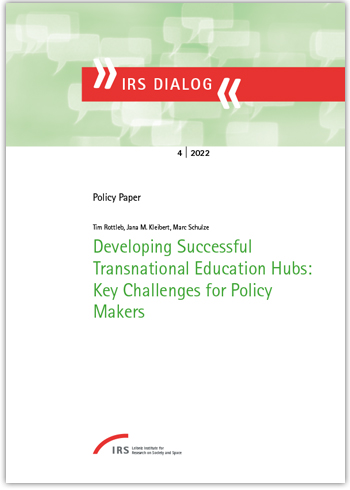Main Content
Policy Paper on Transnational Education Hubs: How Branch Campuses Can Contribute to Economic Transformation

Especially in countries striving to transform themselves from a commodity economy to a knowledge economy, the establishment of "transnational education hubs", i.e. clusters of branch locations of international universities, is a popular location policy tool. But hopes for a transformative effect on the local economy are not always fulfilled. In its new policy paper "Developing Successful Transnational Education Hubs: Key Challenges for Policy Makers" (IRS Dialog 4/2022), the IRS Junior Research Group TRANSEDU has identified the key challenges and formulated recommendations.
Since 2018, the Leibniz Junior Research Group TRANSEDU, led by Jana Kleibert, has been investigating the internationalisation strategies of higher education institutions. In particular, it is looking at "offshore campuses", i.e. branches of universities. In a policy paper published in 2021, it already examined the perspective of the universities themselves: They hope for both financial and reputational gains from international branch campuses, but also take great risks in doing so. The policy paper "Strategy First: Ten Questions to Answer before Starting an International Campus" identified the risks and provided those responsible in universities with ten guiding questions that they can use to examine whether a planned offshore campus project makes sense or not.
Now the group takes the perspective of the host countries and asks how their expectations of university branch campuses relate to the structures, motivations and practices of the universities establishing the campuses. The policy paper addresses stakeholders involved in the design of Education Hub projects as well as advisory and support organisations in international higher education. The authors highlight three key points:
First, the motivations of governments and universities may differ. Policymakers need to take into account that, contrary to popular belief, universities do not automatically contribute to national or regional development goals. For example, they often prefer to focus on easily marketable and highly standardised teaching offerings (e.g. MBA degrees) in their branch campuses rather than on complex research and transfer activities.
Accordingly, secondly, appropriate frameworks for the regulation and location of transnational higher education need to be introduced and further developed. Overly permeable systems can attract dubious providers and lead to frictions with local higher education systems, hindering successful transfer of knowledge to the domestic economy.
The local anchoring of branch universities requires, thirdly, external incentives. Hoped-for activities, such as cooperation between branch campuses or with domestic universities and synergy effects with the local economy, need to be actively promoted by the host country authorities.
Overall, the authors argue that a balance needs to be found between an investment-friendly environment on the one hand and governance mechanisms that actively promote desired effects on the other.

